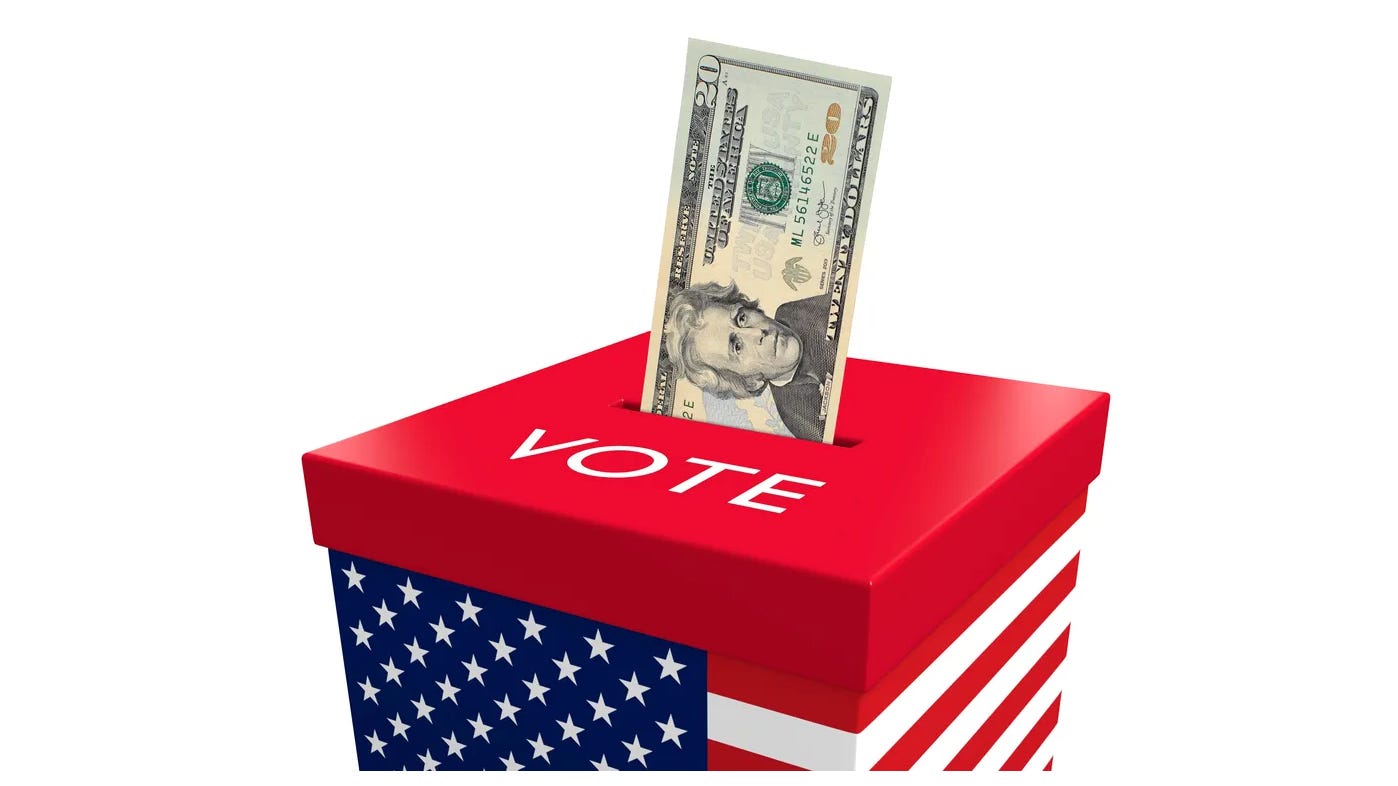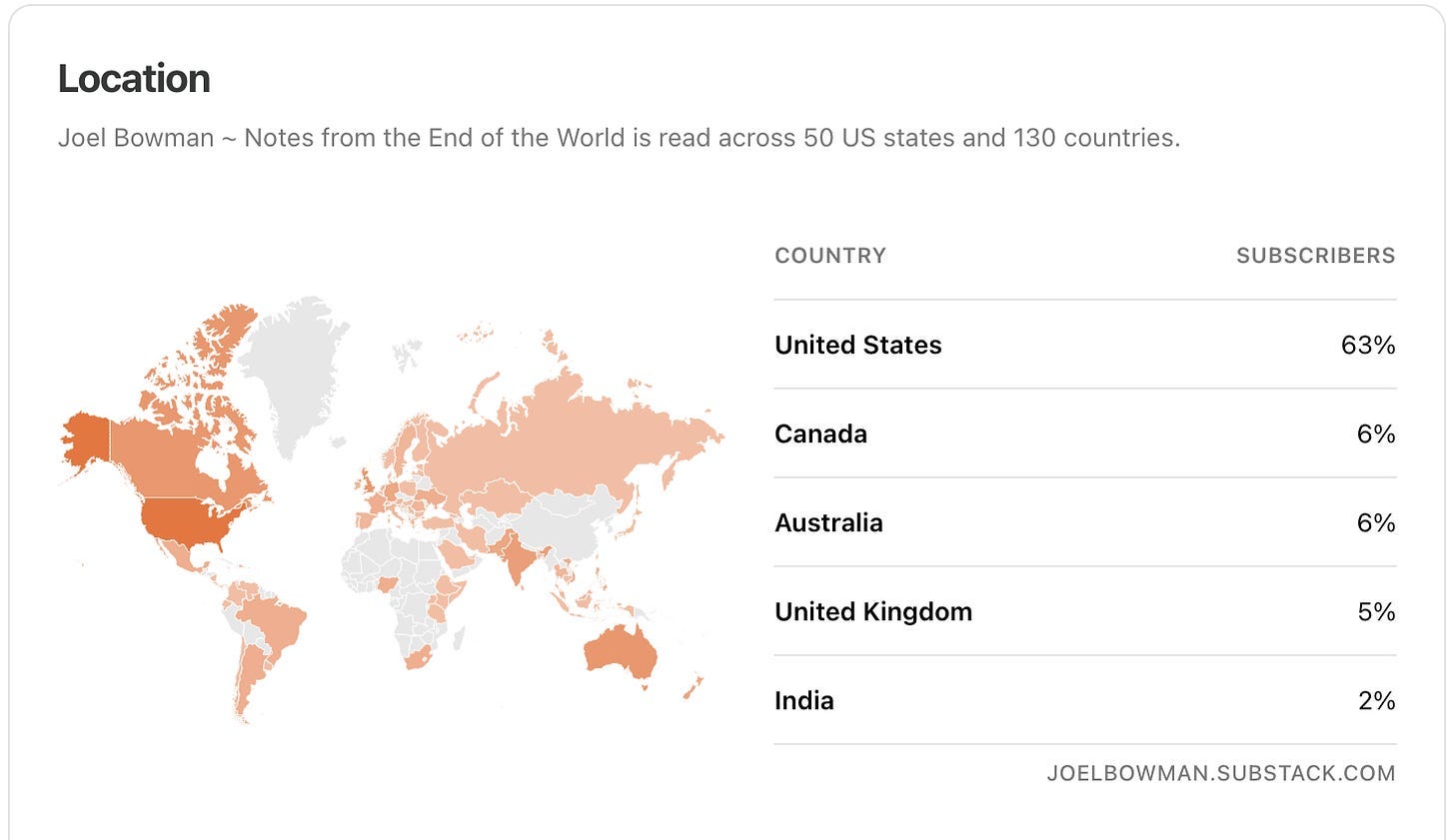The Best Government Money Can't Buy
Balanced books, lower taxes and other rare political phenomenon...
“We have the best government that money can buy.”
~ Mark Twain
Joel Bowman with today’s Notes From the End of the World: Buenos Aires, Argentina...
A dear reader wonders:
“Is Sr Milei gaining more grassroots backing and enthusiasm from the people? Do they recognize what he is doing for them? They and their country will be unstoppable if they force him to keep his promises to them. This is exciting to watch. Thank you for bringing it to us.”
Among the promises to which our reader refers is included a “non-negotiable” commitment to “zero deficit” government budgets. (Argentina’s president, Javier Milei, redoubled just such a pledge in an historic speech to Congress this past Sunday – see Tuesday’s Note for details).
We’ll get to support, grassroots and otherwise, for Sr. Milei and his whacky libertarian promises in a moment, but just to take a step back...
Rare Birds
The notion that a government might spend less than it steals is indeed something of a rare bird in this age of modern, representative democracy. That it might actually return the difference, through tax cuts to working people, is a phenomenon practically unobserved in the wild.
Typically in a democracy, voters elect whichever party promises them more of other people’s money. Thus does each election come to resemble what H. L. Mencken famously described as “an advanced auction on stolen goods.”
In just such a way does the many come to rely on the few, until the few can no longer foot the bill, and either Atlas shrugs... or there’s blood in the streets.
But how many is too many? When does “rule of the mobjority” enter terminal decline? Hard to know, exactly...
In 2019, research by the the US Department of Health and Services found that nearly 100 million Americans (roughly a third of the population at that time) participated in one of ten federal assistance programs, ranging from child care assistance to food stamps (SNAP) to housing programs and various other state funded provisions. The report also found:
More than one in four working-age adults (27 percent) and nearly one of every two children (49 percent) participated in a safety net program.
One in six people (16 percent) and one in three children (33 percent) participated in multiple safety net programs.
Among beneficiaries, 54 percent of people participated in multiple programs including two out of three children (67 percent). Among people in the United States who received a benefit from two or more programs, most were children or older adults (56 percent).
Consider, too, that The Covid was still a twinkle in the eyes of would-be government meddlers. Not a single stimmie check had so much as been inked.
Statist Quo
In Argentina, the situation was even worse. As of 2020, 55% of all “workers” in the country, from the Andes to the Atlantic, were employed by the government. In the decade from 2012-2022, public sector employment swelled by 34%... compared with just 3% growth in the anemic private sector.
With so many snouts in the trough, so many people dependent on the state’s largesse for their very livelihood, who could have foreseen a change in the Statist Quo? It’s all well and good to talk about free exchange and libertarian ideals... but it’s difficult for a man to believe one thing when his paycheck depends on his believing another.
That is, of course, until the paychecks stop... or stop being worth anything, which is practically the same thing. Recall the popular joke among Soviet factory workers: “We pretend to work, they pretend to pay us.”
Such was the case when it came time for the presidential elections in Argentina, in 2023. By then, the local peso had earned the dubious accolade of the #1 most inflationary currency on the planet, beating out tough competition from the likes of deadbeat economies in Turkey and Venezuela. In December, the month Sr. Milei assumed office, wholesale price inflation in the country was a whopping 54%... per month.
Such was the pace of price inflation that restaurants didn’t bother including prices on their menus, nor did shops include prices under items on the shelves. By the time you reached the front of the line, or when the check finally arrived, the prices were already out of date.
Fast forward to today, and the situation is markedly different. Here’s the latest data, out of the National Institute of Statistics (INDEC) just this morning...
Never Ending Chainsaw
Fellow economist and Sr. Milei’s deputy spokesperson, Manuel Adorni, announced:
“According to the index, it was 2.1%. For us, it is always relevant because it anticipates what is coming in terms of retail inflation. This 2.1% is the lowest record since May 2020 and reflects the price stability in the Argentine Republic.”
As for Sr. Milei’s popularity among voters, his approval rating remains “stubbornly high,” according to legacy news outlets desperate to see him fail. Here’s the BA Times, grimacing under the weight of their own ridiculous headlines...
'The chainsaw never stops' – Milei’s support survives his economic experiment
Argentina’s libertarian president came to power promising to slash spending. Voters are suffering, yet polls show his support endures — for now.
Milei’s popularity stands at a healthy 52 percent, a one percentage point bump from February, according to polling firm Management & Fit. His immediate predecessor, Alberto Fernández, racked up a disapproval rating of 79 percent by the end of his term, and is now fighting allegations of domestic abuse that risk compounding the now-opposition’s woes.
There’s even signs of cautious optimism that Milei’s La Libertad Avanza (LLA) party will make congressional inroads during the upcoming midterm elections in 2025. The latest polls (from RDT Consultores) show LLA with more than double the support of the opposition Kirchneristas (Peronists/Socialists).
It’s too early to tell yet, but so far it looks like not destroying the currency, balancing the books and keeping election promises might even be popular among the voting public. Who knew?
Stay tuned for more Notes From the End of the World...
Cheers,
Joel Bowman
P.S. Might unpopular ideas – free markets, civil liberties, common sense – be enjoying a resurgence… even in the woke West?
Might thoughtful individuals be ready to ditch the ‘statist quo’ in favor of a more peaceful, voluntary existence?
Might citizens be ready to shrug off the illusion of choice proffered by their would-be political leaders and their puerile porters in the mainstream press?
Such a reality might be closer than you think. Already, millions of people in hundreds of countries have tuned out of state propaganda, meant only to divide, conquer and impoverish people.
How do we know?
Well, we don’t… but we have reason to be cautiously optimistic. Even these humble Notes now reach dear readers in all 50 states across the US… and in 134 countries around the world. Not bad, given that we only just kicked off this year.
Of course, the ideas of freedom, liberty and independence are not going to spread themselves. And that’s where our dear members come in. Thanks to their support, we are able to remain fully independent… which means no advertisements, no bosses and no bias.
Just free markets, free minds and free people… all the time.
If you’d like to support our work and join the growing community of folks interested in these lately resurgent ideas, please consider becoming a Notes member today. Cheers!








Good to hear that people are rallying to a balanced budget, a smaller government and some promise keeping.
I asked CoPilot (ChatGPT apparently doesn't have access to this data), about the prices of a Big Mac, a basket of groceries (bread, ricel, pasta, flour, meat, fish, eggs, legumes, milk, cheese, yogurt, fruits and veggies, coffee, tea, juice, basic cleaning supplies and personal care products), and a liter of gas.
The Big Mac changed on average of 1.27% a month between January 2023 (when we were last there) to August of 2024. High of 1.43% in Jan 2023. To low of 1.14% in August of 2024. $3.55 USD, to $4.45 USD in that time.
The basket of groceries went from $550 USD in Jan 2023, to $740 USD in Aug 2024. According to CoPilot. $10 USD a month. An average change of 1.57% over the entire period of time.
When I asked CoPilot what the average Buenos Aires wage was it came back with $626 USD a month. I then asked it how could anyone in Agentina afford a basket of groceries at $740 USD a month when the average wage was less than that. It replied with "Good question!" and reverted to the canned answer of multiple income sources, savings or financial assistance. An answer you might use pertaining to any country these days.
Finally, the price of gas. It was $0.82 USD a liter in January 2023. It now sits at $4.90 a liter. Biggest jump was in May of 2024 when it went from $0.98 a liter to $4.30 a liter. A 338% jump, month to month and a 19.48% increase over that period of time.
When I asked CoPilot why the big gas price increase in May of 2024, it replied that the government had removed fuel subsidies and made an adjustment in tax rates, which was the big reason for the jump in prices at the pump.
I personally got 3.1% cost change of those 3 items (Big Mac, Gas, Basket of Groceries) during the month of August 2024 vs the Argentina's number of 2.1%. Funny how even the underdog will skew numbers in their own favor, when given the chance (likely leaving gas prices out of the equation as May's numbers would have been WILDLY skewed by gasoline alone).
So while there is hope, there is and will be, a lot of pain for the poor folks of Argentina.
Let's also hope, that Milei stays away from the lure of the military industrial complex, as Dillon mentioned in his post and link to McMaken's article.
Sorry Joel, but with well over 100,000,000 democrats sucking off the government/tax payers tit, the free feast will continue until it doesn’t. Then we will contend with 100,000,000 democrats destroying the third world shitholes they created. Should be fun to watch from a distance 🤔